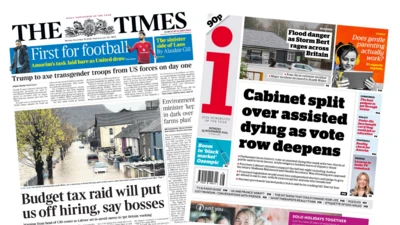We've updated our Privacy and Cookies Policy
We've made some important changes to our Privacy and Cookies Policy and we want you to know what this means for you and your data.
Spending Review: Treasury negotiations end as Cable settles
Chancellor George Osborne will announce £11.5bn worth of cuts in Wednesday's Spending Review, after the Treasury concluded budget negotiations with other government departments.
The review covers spending for the year 2015/16, which includes the election.
The Department for Business, the last to settle, will face slightly lower cuts than the typical 10% reduction.
Ministers will also set out plans to invest billions in transport, science and other capital projects on Thursday.
The election is scheduled for May 2015 and the Conservative-Lib Dem coalition government has to set out its spending plans for the final few weeks of its time in office, starting in April 2015, irrespective of the outcome of the poll.
Capital spending
Labour, however, has said that it will match the coalition's current spending totals for that month and the rest of that financial year.
Most departments are facing cuts of between 8% and 10% although health and schools in England and the international aid budget are all ring-fenced, as they have been since 2010.
The ┤¾¤¾┤½├¢'s political editor Nick Robinson said Business Secretary Vince Cable agreed the latest round of cuts for his department in a phone call with the Chief Secretary to the Treasury Danny Alexander on Sunday.
The negotiations were said not to have been rancorous, Nick Robinson added, despite heavy briefings to the media suggesting that Mr Cable would take the discussions to the wire.
Mr Osborne revealed on Sunday that he had reached agreement with Defence Secretary Philip Hammond over a package which will see further civilian jobs cut in the Ministry of Defence but "no reduction in military capacity".
Negotiations over the education, transport and local government departments also had to be finalised on Sunday - in particular how the government's plans to spend £3bn extra on capital spending would be divided up between departments.
On Wednesday, Mr Osborne will also announce the capital budgets for each Whitehall department and, the following day, Mr Alexander will announce the detailed and long-term plans for spending on roads, rail, housing and the like.
Road building
reported that projects likely to be approved include the upgrading of the A14 trunk road connecting Felixstowe in Suffolk, the UK's largest container port, with the Midlands.
There have been repeated calls from business groups to get work going on infrastructure and other construction projects to help boost growth.
The chancellor will also use Wednesday's speech to outline the details of how his proposed cap on parts of the welfare bill will work.
He announced his intention to cap benefit expenditure that does not rise and fall in line with the wider economy in March's Budget, a position since adopted by Labour.
The chancellor initially hoped to eliminate the structural deficit - the portion of borrowing which is not affected by changes in the economic cycle - entirely by 2014-15.
But the timeframe for this has slipped to 2017-18 and Mr Osborne will have to borrow £275bn more than he expected in this Parliament than at the time of his first Budget in 2010.
The government says it has cut overall borrowing by a quarter since coming to power and by a third as a share of GDP but Labour says the austerity drive has effectively stalled.
Revised official figures released on Friday showed that borrowing rose slightly to £118.8bn in 2012-13 from £118.5bn the year before.
Top Stories
More to explore
Most read
Content is not available








